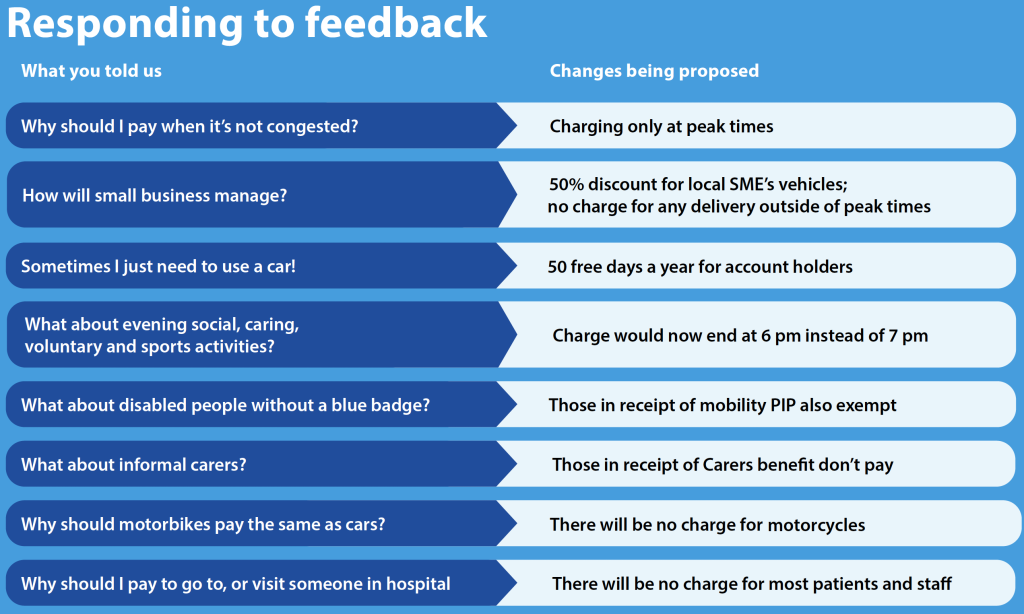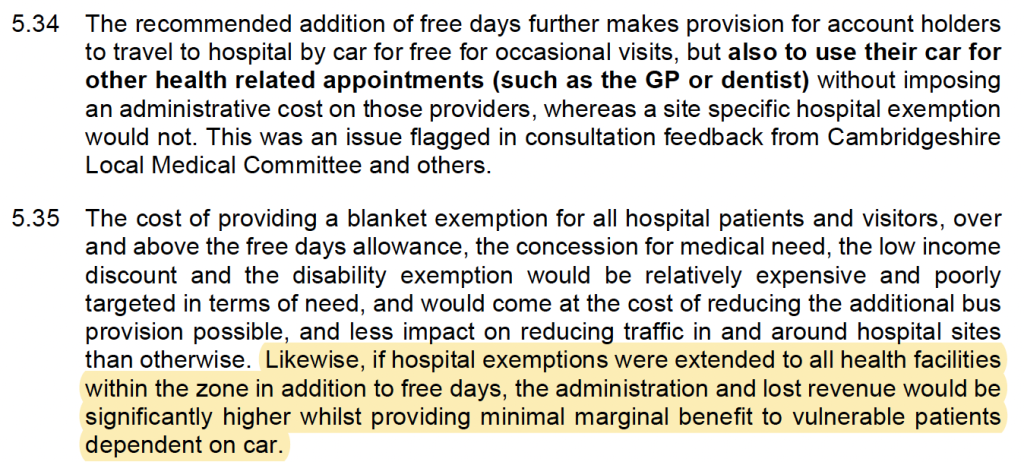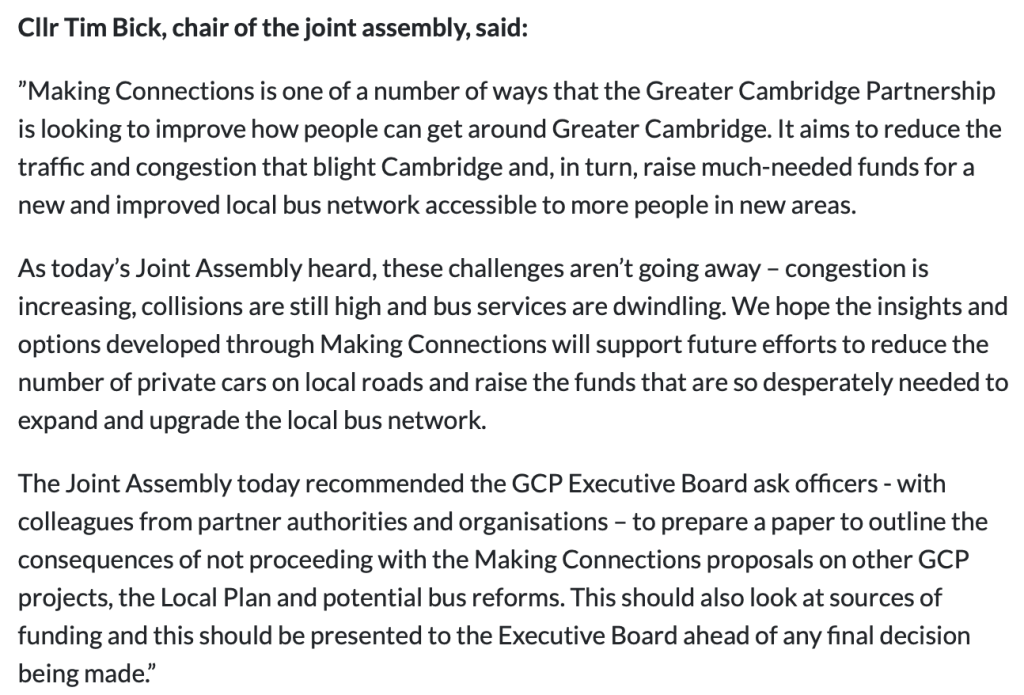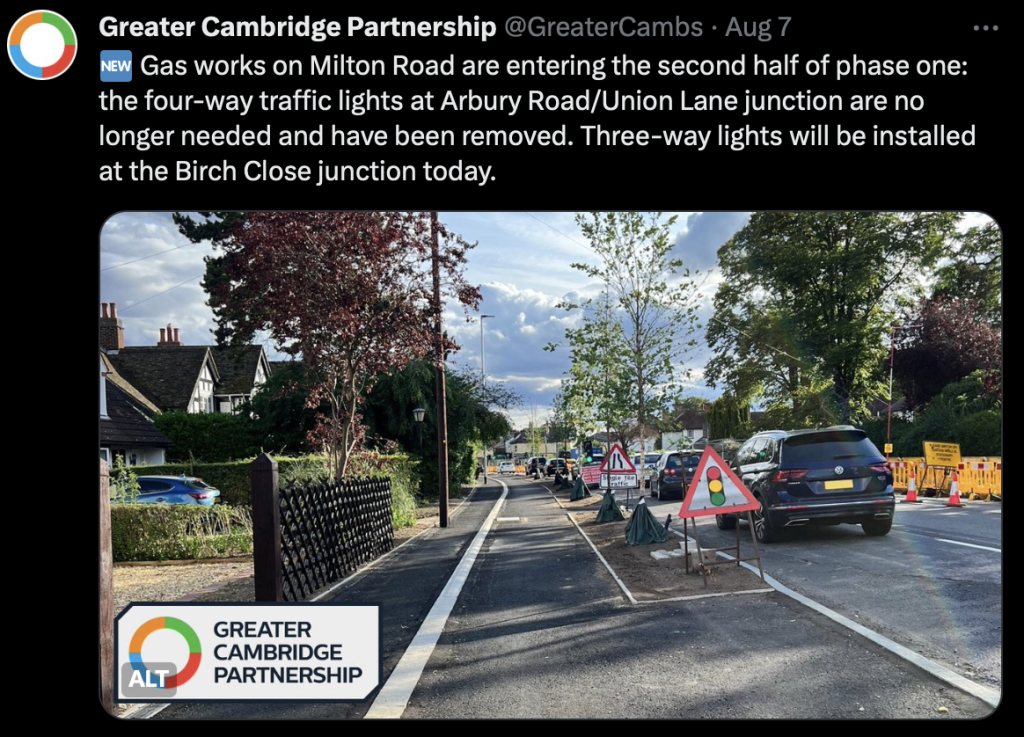The Zone has been running a highlighter over the new salesman’s brochure published by the Greater Cambridges Partnership (GCP) and the slightly more detailed documents provided to the GCP Assembly meeting. What an event to sit through that was. A gentle wave is offered to others who endured it, too.
This could take a while, and there is an interval, so bring your own drinks.
Hang on, you cry. What is the point? The STZ is dead. Well, it isn’t, not yet. No one has voted it down. It could be described as ‘Critical but Stable’.
Please don’t shout “but there is ‘no support’ for it”, it won’t help. There may be ‘no support’, but that isn’t the same as a majority no vote. Remember those? The original consultation had 58% of you saying they do not support road charging or the Sustainable Travel Zone (STZ). Whilst 58% is a majority, the GCP and politicians don’t necessarily see numbers like everyone else. It would take a no vote to kill the STZ off.
Votes are beautiful things. Votes enable the chair of the GCP Joint Assembly, Councillor Tim Bick, to propose that the Joint Assembly should not scrutinise the GCP’s revised proposals. The one key thing the Joint Assembly is supposed to do. It is what it does. It is why it exists. It is vital feedback for the GCP Executive Board. Given the pre-prepared statements made by some, it was apparent some members also knew of this approach before the meeting. It also neatly means concerns from members of the Joint Assembly will not make it into the public record. But we digress…
Are you sitting comfortably? Then I’ll begin.
Well, almost ready to begin. Let us go back up a paragraph to the mention of scrutiny. This latest GCP proposal requires scrutiny. It claims to be listening and responding to the issues the people raised during the consultation. It is, unfortunately, akin to the first Making Connections document. Discrepancies still exist. It is still a raw deal for some, especially those needing healthcare, carers, and those on low incomes. Some of these groups are even worse off than Plan A. This scrutiny didn’t happen. It should have. The members of the Assembly who voted not to do their duty, especially the chair who unilaterally decided on this course of action, should feel uncomfortable about that. This is just one example of where the GCP are failing.
Here goes…
It is probably easier to forget the promises of what would be delivered under the original Making Connections proposal. Wipe that from your memory. There is no London Style Bus network. Replaced with some comments over cheaper fares, the old £1 and £2 fare caps are not as good a deal if you are a regular bus user. Existing ticketing is cheaper. Some faster, read not stopping as much, shuttles from places outside Cambridge. These would stop at the Travel Hubs (Park and Ride to you and me), where you change onto a P&R shuttle into the City. The remainder seems to be additional buses servicing the Addenbrookes campus to and from the Travel Hubs, aligned with the shift patterns of staff working there.
So what does the £26m a year provide? Please don’t ask the GCP, they have thrown that little problem over the wall to the CPCA, like an unwelcome snail in the garden when you don’t like your neighbour. What will the CPCA do with it? They don’t know either. It’s undefined, unknown, yet to be decided on bus franchising or enhanced partnership. Take a moment here, pause and reflect.
What your cash will be spent on is as yet unknown. The GCP doesn’t know.
Fair enough, it gives the GCP a ‘Legacy’ it desperately needs. It’s a bit backwards to the norm, but perhaps that is politics.
So then, how has the GCP listened to your concerns and taken steps to mitigate your issues with the previous scheme?
Let us begin with the headlines in the salesman’s brochure from page 4.

We shall have a quick run through these headline items. These, after all, are the GCP listening and adapting to quell your fears and concerns, dear reader, the public.
Why should I pay when it’s not congested? – an excellent question. By the GCP’s definition, congestion isn’t an issue between 10 AM and 3 PM. Oddly, it was before. Huge problem. Nevertheless, it is a welcome admission to the needs of people. Maybe they have looked out a window into the real world rather than rely on models fed by inaccurate data. People and businesses need to be able to move without paying a tax for the privilege. Go, GCP pats on the back all around.
How will small business manage? – a discount is good news for them. It brings their annual direct cost down from £2,510 to a mere £1,255. For someone self-employed they get to take a pay cut less than before. There is no mention of a potential discount for moving to an EV van, so the “going green” incentive is lost.
No charge for deliveries outside peak times makes no sense, however. Unless you *pay* for a specific delivery window, generally before a particular time, such as before 10 AM or 1 PM, you have no say when a delivery arrives. Will the couriers all hover outside the zone, ready to pounce and drop everything off during a crucial 5-hour window? It is a bizarre justification. Oh, and no free days for anything other than cars. So if you use your small van for shopping too, you’re out of luck.
What about evening social, caring, voluntary and sports activities? – This is great. Except for the caveat of the word evening. Plan around doing everything in the evening, and you’re fine. Sadly, many such things happen during the day, too. Especially caring for people. Often, this occurs at all times, 24 hours a day for some. Presumably, this is aimed at working families who need to shuttle children around in a timely fashion. Public transport cannot achieve anywhere near the time efficiencies of a multi-stop trip via private transport. Nor would even the “London Style” bus network have had the capacity where it was needed to do so.
What about disabled people without a blue badge? – Good news here, thumbs up. The mobility PIP inclusion is excellent.
But what about those with a Blue Badge? This requires some serious clarification. We have been here before….. Cllr Alex Beckett, Chair of the Transport Committee meeting on 7 March 2023, stated the following just before the vote to close Mill Road Bridge. A critical point that potentially swung the vote.
Can I just clarify that carers as well the current policy extensions allows blue badge holders to register two vehicles. It doesn’t require them to be in the vehicles they are allowed to register two vehicles, so therefore a blue badge holder that had a carer could potentially give one of those registrations to the carers vehicle and then they would be allowed to pass so there are some provisions in that.
Cllr Alex Beckett, Transport committee meeting 7 March 2023.
However, after the vote, the officers (some were in the meeting but said nothing) “clarified” this as incorrect. The Blue Badge holder must be in the vehicle when it passes the bus gate. Very different to the assurance from the Chair.
Guess what? This is the text from the Scenario 1A supporting document. Two sets of text, one with the critical caveat and one without. You always read *all* the supporting documents, don’t you?


The Zone notices that the Blue Badge holder or mobility PIP folder can register the vehicle of a carer, so their journey is exempt “when making trips with them“. This makes a world of difference. The unpaid carer would not be exempt from the charge unless the person is with them. So they pay for the journey to pick them up or return them, as they are not in the vehicle with them. In practice, this is unenforceable. Legally speaking, however, should a carer be caught out, the Blue Badge holder would take the penalty – they could lose their badge.
If anyone tells you the person you are helping doesn’t need to be in the car, take that with a pinch of salt. Perhaps use a shovel. Or hire a digger. There is a documented history of saying one thing to get past a crucial vote and then imposing the opposite. You have been warned.
What about informal carers? – “Those in receipt of Carers benefit don’t pay” is the answer. This is an odd headline point, as it’s fundamentally misleading. Let us take a peek at the GCP’s more detailed document.

So, they do pay. How many will read the supporting documents over the glossy salesman brochure?
But let us also consider the terminology here. Scrutinise it, if you will. The Joint Assembly didn’t want to, so here goes.
“An unpaid carer who claims Carer Allowance.” What does that mean? Well, a person who cares for another when it isn’t their job. They may have a full-time job, too. So what is the Carer Allowance? We shall defer to the Government to define this:
"You could get £76.75 a week if you care for someone at least 35 hours a week and they get certain benefits."1.
Yes, you read that right. The carer allowance is for those who spend at least 35 hours a week caring for someone else. That is a full-time job for the rest of us. Unless you work for South Cambridgeshire District Council, that is. Then you would work for 28 hours but get paid for 35.
Oh, and If someone has two carers, then under these proposals, all but one pays the total cost of the charge. To quote the Government again:
"If someone else also cares for the same person as you, only one of you can claim Carer’s Allowance."
So, carers who rely on a car do pay. They pay £12.50 of their £76.75 weekly allowance for performing their role. That is 16% of their allowance. These are often the lowest-paid people. The people who silently struggle to balance their time and budget. Naturally, they could change their needs to always move around outside the charging period. That could be seen as discrimination, as it restricts the movement of a group of people based on the time of day. The lawyers among you can debate that one.
For the truly informal unpaid carers, the people who get nothing for helping others. The group who perhaps do the most for others with little or no recognition. The GCP answer is to use your household’s free days or pay. The Zone wonders if this is really listening to the needs of those in society who need the most help. Perhaps ask your councillor? Don’t ask some on the Joint Assembly. It isn’t worth their time.
Of note is the lower income residents of Cambridge now get a 50% discount. Previously, it was a tapered 25% to 100%, depending on the level of hardship, to quote the GCP. So, Scenario 1A is far worse for those on the lowest income. Go figure.
Why should motorbikes pay the same as cars? – Why indeed! Given some cargo cycles, these days are larger than motorbikes, it made no sense. As the Zone mused over before, none of the stated reasons were related to reality.
Why should I pay to go to or visit someone in hospital – Why indeed! The key here is the caveat: “There will be no charge for most patients and staff”. First, visitors will pay unless you pick your visiting time outside the charging times. You can always visit using one of your household’s free days. If you are not also caring for anyone on those precious days.
Note this is carefully worded. It includes the caveat of the hospital. What about those needing to access healthcare in all its forms outside the Hospital? Let us lift the rug again and peek at the lumps underneath found in supporting documents.

Previously, there was great concern that access to primary healthcare by non-public motorised transport would be chargeable. Guess what? Whilst the hospital may be simplified, everywhere else – nothing. No discount, exemption, or reimbursement. The reason is financial. The GCP has admitted to the vast admin costs of the previous scenario. However, it is still too costly to do anyway. To quote the GCP, “the administration and lost revenue would be significantly higher whilst providing minimal marginal benefit to vulnerable patients dependent on car[s].” This means it can’t be done. Finances trump the vulnerable.
The GCP, never fear, has the answer. A big round of applause for the household’s free days allowance! You are going to really need to plan when you use those. If you are a vulnerable patient or care for one, plan your healthcare well to avoid paying to access healthcare. Always book your appointments between 10:00 a.m. and 3:00 p.m. Less in reality, as you need to get there and back in the window. Let’s hope your appointment time doesn’t run late…
Phew, that is just one page of the salesman’s brochure. Just that one page rings a few alarm bells about how this new proposal addresses the issues raised with the original. Do you think it requires, perhaps, a little further scrutiny?
Before your drinks break, why does the Zone refer to the Salemans’s brochure? Well, because it is there to “sell” the scheme to you. Even the GCP agrees.

Let us take a short break. Pop back when you’re ready.
So then, these free days. Glorious free days where you can move around the City without a care in the world. Well, you should care. Journeys have a cost. Shame on you for nodding along just now. The Zone doubts anyone drives around simply for the sheer enjoyment of it. The Zone is glad to see that the move to other modes of getting about within the City is on the rise and has been steadily for years. Go people! Likewise, those coming into Cambridge from outside make more and more use of the Travel Hubs or Park and Ride in case you’ve forgotten the rebrand. The new EV buses servicing the Travel Hubs will also greatly reduce the single largest polluter in the centre of Cambridge, as 49% of it is caused by diesel buses.
So then, what are they for? Let us ask the GCP:

On the face of it, the GCP does admit that some journeys require a car. Good on them. That is quite a U-turn. Not everything can be done with a cargo bike, it seems. Some pressure groups may disagree here. After all, the cycle is the king of transport modes, is it not?
So now you have some homework to do.
Think about you and your family over the course of a year. Would this solve things for you? Could you get things done that need to be done during the chargeable hours of 0700-1000 and 1500-1800 using your household’s free days? Could you do everything outside the chargeable windows? This is around one free day a week to save you from hunting down your abacus.
Don’t forget, if there is more than one car in your household, the 50 free days are shared by them all. Share a house with others. You all share the free days. Live in an HMO, the same applies. Those 50 days are for the household to share, not you or per car.
These free days are linked to your household creating an account. The trips get ticked off your account as your vehicle(s) are detected. This concession is as much for the GCP as you. It helps reduce the admin costs, as you must register all your vehicles in the system. Saving the cost of looking up the registration numbers each day as you pass a camera. They can match them to your account, saving them a fortune. In fact, it could be an earner. They may even levy an admin fee. Cash is king.

Note account holders can be *anywhere*. It isn’t a resident only thing. A tourist heading to Cambridge for a week can create an account and come into the City for that week for free. Is that fair? No. But then the whole scheme contempt isn’t either. Live with it.
The Zone freely admits that the free days are a good thing. It may help some people. It could just as well change how people live their lives around them. Checking if they are close to their limit and worrying about it is stressful.
It does help reduce the financial impact of the original proposals. It isn’t a magic solution, either. For many, the charge would still apply. In effect, it simply gives people a £250 discount, which for many means they only need to find £1,005 a year. Those who need to commute out of Cambridge, for example. Nothing really changes for them.
Lastly, scrutinising things really should be being done by others. Let us look at the official GCP statement on the Joint Assembly meeting. A thing of beauty.

He was there. The Zone saw him there. His recollection is a little different to what happened. This, presumably, is a post-meeting statement rather than from the meeting itself. No mention, at all of the Joint Assembly refusing to scrutinise the new plan. Oh no. The Assembly wants a paper documenting the consequences of not proceeding with the proposals. The ones they didn’t scrutinise. The Zone must conclude that they were fine, nothing to see here, and would have been waved through. After all, to go directly to consequences of why something didn’t happen presumes it would have if those pesky kids hadn’t got in the way, for all you ScoobyDo fans out there. Perhaps some of the Joint Assembly members would like to provide their views of the proposals, as the chair didn’t.
As the chairman of the Joint Assembly is permitted a rant, the Zone feels it is appropriate to express a little emotion too. Hang on. This could get bumpy.
The GCP seems intent to go all in STZ or nothing. This is the only solution. Nothing else will do. They have examined every other possibility and rejected them all. They will do almost anything to achieve that goal.
They are failing. They are untrusted. Even when “marking their own homework” using the Joint Assembly to scrutinise their plans, they fail. Project costs overrun massively. The programme of works is oversubscribed. Projects are delivered late. The projects, when complete, are not always of the best quality. Consultation responses that disagree with the proposals are sidelined, rolling out data from a Citizens Assembly that met three years ago. A Citizens Assembly “assisted” by a one-sided panel of advisors. A Citizens Assembly who were asked to comment on a restricted set of views and suggestions presented to them.
A picture says a thousand words. From the GCP tweet, sorry Xeet, of the new £25m+ Milton road upgrade in August.
Cast your eye not to the cars waiting at one of the many temporary lights required for 2 years of road works. Nor the notice about the gas works. Look to the left. The small strip of tarmac. With the lamp posts on. That is the pavement for pedestrians, baby buggies, guide dogs and wheelchair users to use.

Think about it when you’re standing, isolated, on one of the many congestion creating non LTN 1/20 compliant floating bus stops littering Cambridge2.
That is how the GCP treat the population of Cambridge. You are sidelined. You are the problem. Your view is not part of their solution. It is their way or no way. The GCP will attempt to blame everyone but themselves for their position.
It is endemic in the way senior officers treat those who contradict them. It is a systemic problem within the GCP. Present an alternative view, and you will be ignored. The GCP will not accept it. The attitude is simple when alternative, cheaper, greener options are presented to them. You are wrong. End of discussion.
Let us hope their upcoming Gateway Review is made public, takes input from the public, and does not simply get fed what the GCP wants. The GCP requires scrutiny. The GCP requires auditing. The days of the GCP doing it on themselves are at an end. Who will scrutinise the GCP when their own process for doing so walks away from doing so?
- https://www.gov.uk/carers-allowance ↩︎
- LTN 1/20 6.6.10 The island between the cycle track and the carriageway needs to be wide enough for people to stand and wait for a bus and to site a shelter if one is to be provided. The island should be a minimum of 2.5m wide, which will accommodate parents and buggies, visually impaired people with a guide dog or a person using a wheelchair to allow a bus wheelchair ramp to be deployed. https://assets.publishing.service.gov.uk/government/uploads/system/uploads/attachment_data/file/951074/cycle-infrastructure-design-ltn-1-20.pdf ↩︎
